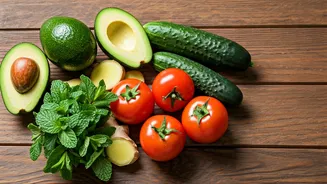Peppermint’s Soothing Touch
Peppermint has long been recognized for its ability to ease digestive troubles. The menthol in peppermint relaxes the muscles of the gastrointestinal tract,
allowing gas to pass more easily and reducing bloating. You can enjoy peppermint in various forms such as tea, which is a gentle way to soothe your stomach after meals, or as a flavoring in foods. Consuming peppermint tea can provide almost instant relief from the sensation of pressure and fullness that comes with bloating. Try including peppermint tea in your daily routine to help maintain a healthy digestive balance. The natural compounds in peppermint work to reduce spasms, allowing food to move through your digestive system smoothly and efficiently. This can prevent the buildup of gas and reduce the discomfort associated with bloating. It is a simple yet effective strategy for digestive wellness.
Ginger's Digestive Power
Ginger is a powerful remedy for bloating and gas. It contains gingerol, a substance known for its anti-inflammatory and antioxidant properties, which aids in speeding up digestion and reducing abdominal discomfort. Ginger helps in reducing gut inflammation and helps in relaxing the intestinal muscles. This can prevent gas from building up and ease the symptoms of bloating. Consuming ginger, either as a tea, added to meals, or taken as a supplement, can provide rapid relief from bloating and improve overall digestive health. Ginger’s properties help the body digest food more efficiently, preventing the fermentation of undigested food in the gut, which often results in gas. Regular consumption of ginger can help maintain a healthy digestive system. It’s a natural and effective way to manage digestive issues.
Fennel Seeds for Relief
Fennel seeds, or saunf, are an ancient remedy known for their ability to combat bloating and gas. They contain compounds that relax the intestinal muscles, which enables gas and other digestive contents to move through the gut more easily. Chewing fennel seeds after a meal is a common practice in many cultures to aid in digestion and prevent bloating. The seeds have volatile oils that help reduce inflammation in the gut, supporting a healthy digestive environment and prevent the buildup of gas. Consuming fennel seeds, whether chewed raw or infused in tea, can provide relief from bloating. It also improves overall digestion. Including fennel seeds in your diet helps to calm the digestive system, making them a useful natural solution for digestive discomfort.
Bananas: Potassium's Role
Bananas are rich in potassium, an essential mineral that can help regulate the levels of sodium in your body. When you consume too much sodium, your body can retain water, which can contribute to bloating. By balancing sodium levels, bananas help to reduce water retention, thereby easing bloating. They are a good source of fiber, which helps in promoting regular bowel movements and prevents constipation, a common cause of bloating. Moreover, bananas are easily digestible and provide quick energy, making them a great snack option. Eating a banana can help calm the digestive system and reduce bloating. They are a simple and delicious way to support digestive health.
Pineapple's Digestive Enzyme
Pineapple contains an enzyme called bromelain, which has powerful anti-inflammatory and digestive properties. Bromelain aids in breaking down proteins in the gut, which can help in reducing bloating and gas. When proteins are not properly broken down, they can cause digestive discomfort and gas. Consuming pineapple, either fresh or in juice, can help ease digestion and prevent these issues. Pineapple’s anti-inflammatory properties can also soothe the gut lining, which reduces inflammation and promotes healthy digestion. Regular consumption of pineapple can improve gut health, helping you feel more comfortable and reducing instances of bloating. This makes it a great addition to your diet for improved digestive function.
Turmeric: The Anti-Inflammatory
Turmeric, with its active compound curcumin, is celebrated for its powerful anti-inflammatory benefits. Inflammation in the digestive tract can lead to bloating and gas. By reducing inflammation, turmeric can alleviate these symptoms. Curcumin aids in reducing spasms and promoting healthy digestion. You can consume turmeric in various ways, such as adding it to your meals, drinking turmeric tea, or taking it as a supplement. It promotes overall gut health and prevents the buildup of gas. Including turmeric in your diet is a natural method to keep your digestive system calm and functioning correctly. This ancient spice serves as a key element in supporting your digestive comfort.
Yogurt and Probiotics
Yogurt contains probiotics, which are beneficial bacteria that help to maintain a healthy balance in your gut. These bacteria assist in digestion and prevent the overgrowth of harmful bacteria, which can cause gas and bloating. Probiotics are crucial in breaking down food effectively, reducing the likelihood of fermentation and gas production. Including yogurt in your diet can improve your gut health. Choose yogurts with live and active cultures. Consuming probiotic-rich yogurt regularly helps to support a balanced gut environment, helping to reduce bloating and other digestive issues. This makes it a smart choice for supporting digestive well-being.
Oats and Fiber's Benefits
Oats, rich in soluble fiber, are excellent for improving digestive health and reducing bloating. Fiber helps to regulate bowel movements, preventing constipation, a common cause of bloating. Oats are slow to digest, which can help in stabilizing blood sugar levels and prevent sudden spikes that may affect digestion. Consuming oats, especially in the morning, can help support a healthy digestive process and reduce instances of gas and bloating throughout the day. The fiber in oats absorbs water, which adds bulk to the stool, promoting smooth movement through the digestive system. This can reduce discomfort associated with digestive issues. Choosing oats is a simple way to improve your digestive health.
Asparagus: A Natural Diuretic
Asparagus is a natural diuretic, which means it helps your body get rid of excess water. Reducing water retention is a key factor in minimizing bloating. Asparagus also contains inulin, a type of fiber that acts as a prebiotic, nourishing the beneficial bacteria in your gut. This supports healthy digestion and reduces the chance of bloating. Eating asparagus promotes healthy digestion. The diuretic properties will also help you feel less bloated. Incorporating asparagus into your diet can assist in minimizing bloating and supporting your digestive health. It is a nutritious and effective food choice.
Water: The Hydration Essential
Drinking adequate amounts of water is crucial for digestive health and can help reduce bloating. Water helps in the smooth movement of food through your digestive system, preventing constipation and gas buildup. When you are properly hydrated, your body functions more efficiently. Dehydration can lead to bloating as your body tries to retain water. Drinking enough water also aids the kidneys in flushing out excess sodium, which can contribute to bloating. Staying hydrated can improve overall digestive health and lessen the chances of bloating and discomfort. Make water a central part of your daily routine to stay hydrated and support your digestive system.
























